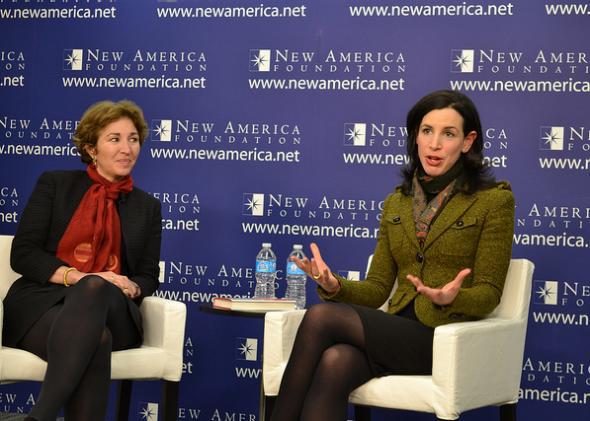On Tuesday, March 4, Emily Parker discussed her new book Now I Know Who My Comrades Are: Voices From the Internet Underground with New America Foundation President Anne-Marie Slaughter at the New America offices in Washington, D.C. Slaughter and Parker, both veterans of the U.S. State Department, explored how the Internet can bring activists together in authoritarian countries—and the extent to which that online organizing can have real-world results.
Parker spent several years reporting her book, which looks closely at online networks in China, Cuba, and Russia. Over the course of that time she became familiar with the roles the Web plays in each. “They’re different because the way the government has controlled the Internet,” she said: China has its famous Great Firewall. Apathy reigns in Russia: “Eighty-five percent of Russians said [in one survey that] they felt they had no impact on their political process. The Internet is not going to change that,” Parker explained. And in Cuba, there is very little access: Just 5 percent of citizens go online.
The title of her book derives from a conversation she had with a Chinese dissident, who told her that the Internet helped him realize he wasn’t alone in having questions and concerns about the government. “Now I know who my comrades are,” he told her. Slaughter agreed that it is critical for activists to know they aren’t alone: A former colleague of hers at Princeton’s Woodrow Wilson School of Public and International Affairs did research that indicated that the members of the opposition often underestimate how many of their compatriots also disagree with their government. But, Slaughter added, “the government knows who his comrades are, too. … Yes, this empowers the opposition, but doesn’t it empower the government even more?”
Parker agreed that governments can use technology to surveil and control their people, but she argued that that does not neutralize the Internet’s ability to strengthen the opposition by bringing people together at a vastly different scale. In Russia, for example, prominent opposition leader Alexei Navalny has recently been sentenced to house arrest and ordered to stay off the Internet. But the Russian opposition will go on without him, online and off. Before the Internet, protests in Russia were tiny and were broken up quickly by the police. “It was completely pointless and it was completely dangerous.” Now, she said, “the power of numbers is going to be a powerful weapon against governments that are trying to crack down on individuals.”
The situation was different in Cuba. “I think China and Russia probably have more sophisticated surveillance,” said Parker. “But in Cuba the surveillance is more in your face.” If you’re at an Internet café, you find yourself worried that the person next to you is an informant. Fear permeates the atmosphere, stifling discussion before it can begin. Yet in Cuba, “the Internet probably had the most transformative effect on the citizens” that she encountered. In part, that was because the netizens used the Internet not connect with the outside world. But there was another critical element: “The Internet in Cuba was psychologically transformative,” Parker said, by empowering people to find a voice. One blogger told her that thanks to the Internet, “I comport myself like a free man.”
Parker was careful not to oversell the Internet’s ability to transform an authoritarian government: “The Internet just reflects the reality on the ground. If that society is ready for offline protests, if it’s ready for revolution, the Internet will play that role.” China, for instance, isn’t likely to have a revolution any time soon. Regardless, Parker praised the Internet’s ability to help overcome psychological barriers that may keep people from organizing and demanding their rights.
“Authoritarian governments always look all-powerful until suddenly they’re not.”
Watch the full event on the New Ameria website.
